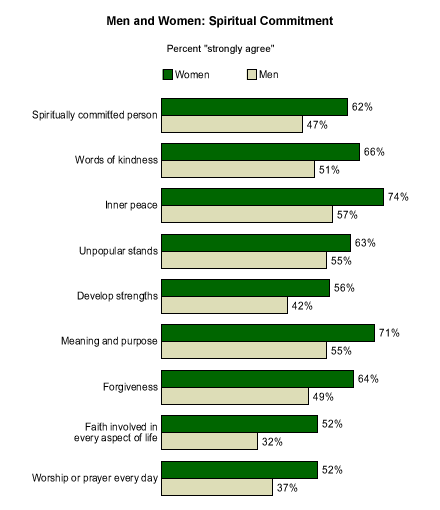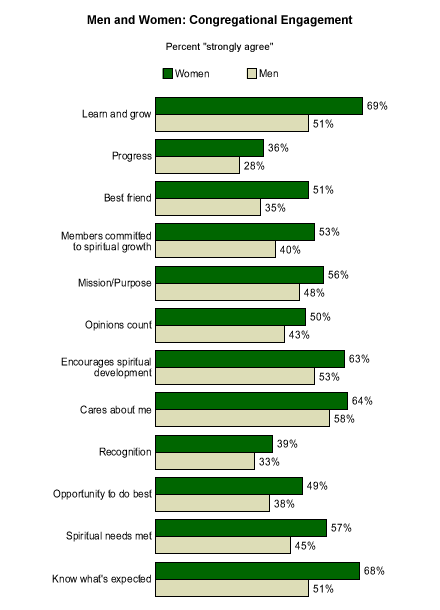This is the second in a three-part series on Gallup's findings regarding the differences between the perspectives of men and women on religion.
As discussed last week, Gallup research has revealed substantial differences between men and women with regard to their religious views and practices. Last week, we examined such differences among men and women in the general population. This week, we look at the differences among those who are members of religious congregations across the country.
Data from Gallup's annual National Congregational Engagement Index poll* reveal significant gender differences at both the individual and communal levels within congregations. Women are more likely than men to strongly agree with each of Gallup's nine survey items designed to measure individual spirituality (see "How to Measure Spiritual Commitment" in Related Items), and also each of the 12 congregational engagement items, which measure one's sense of belonging within a faith community (see "The Driving Factor Behind Spiritual Health" in Related Items).
In terms of spiritual commitment, it appears that religious faith plays a more important role in women's lives than in men's lives. Women are far more likely than men to say their faith gives meaning and purpose to their lives, that their faith is involved in every aspect of their lives, and that they derive a sense of inner peace from their faith.
But it isn't just on attitudinal questions that women score higher than men. Women are also more likely to report behaving in spiritually committed ways, by speaking words of kindness to those in need of encouragement, spending time daily in worship or prayer, and forgiving others.

Besides being more spiritually committed, women also tend to be more engaged in their congregations than men. Some of the differences are quite substantial: women are far more likely than men to strongly agree that they have a best friend in their faith community (51% vs. 35%), that they know what is expected of them as members (68% vs. 51%), that they have regular opportunities to do what they do best (49% vs. 38%), that the other members of their congregations are committed to spiritual growth (53% vs. 40%), and that they have opportunities to learn and grow (69% vs. 51%).

Key Points
Gallup data indicate that U.S. congregations are not doing as good a job of engaging men as they are of engaging women. A key finding is the gap between men's and women's perceptions of opportunities to learn and grow. This is a signal to faith community leaders that the classes, groups, programs, etc., that they are offering within their congregations are not reaching men at the same level as women. If leaders want to reach men, they need to discover what men need in order to learn and grow, and then offer programs that meet those needs.
Another key gap lies in members' tendency to say they have a best friend in the congregation. Apparently it is easier for women to develop close friendships within their faith communities than it is for men. Leaders need to be aware of this and work to expand opportunities for men to create and deepen friendships.
With regard to the higher rate of women's "strongly agree" responses to the spiritual commitment items, it is important to remember that Gallup research shows that an increased level of congregational engagement leads to an increased level of spiritual commitment. In other words, if religious leaders want to improve the spiritual lives of men in their congregations, they should focus on boosting their level of engagement with congregational activities.
*Results are based on telephone interviews with 729 adult members of a church, synagogue, or other religious faith community, aged 18 and older, conducted October through November 2001. For results based on this sample, one can say with 95% confidence that the margin of sampling error is ±3.6%.
Next week's article will discuss the keys to engaging men.
